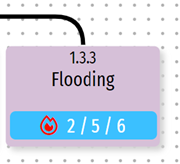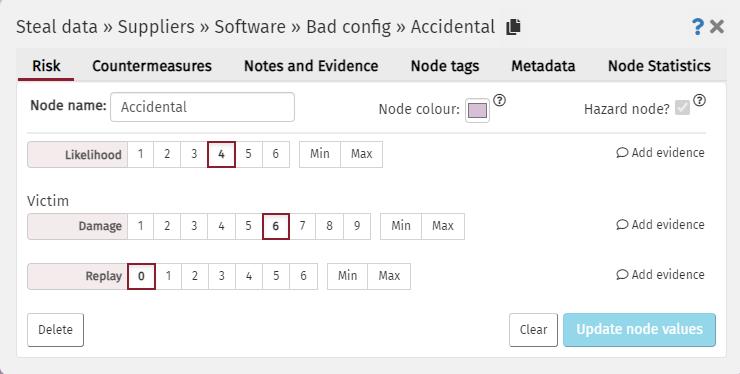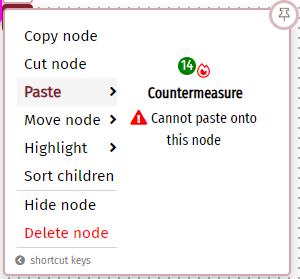Natural hazards
Introduction
A natural hazard is a type of risk that can be included in a RiskTree. It represents risks that are not caused by a malicious attacker, but instead occur by accident. This could include a flood, a power failure, or a piece of equipment failing. It will have different assessment values to an attack risk. In place of the four attacker values, RiskTree uses a single value for the likelihood of the attack; this expresses the probability that the attack will occur, from highly unlikely (1) to highly likely (6). Natural hazards are indicated in RiskTree with a symbol.
Creating a natural hazard risk
To set a risk as a natural hazard, simply click on the Natural hazard checkbox when creating the risk node. This will automatically change the selection of risk assessment values for the node. Intermediate nodes (i.e., those with children) can be defined as natural hazards too. It is good practice not to mix natural hazards and attacks, so we recommend creating one or more branches of your RiskTree for natural hazards, with all of the nodes set with this flag. RiskTree will not let you create attack nodes as children of natural hazard nodes.
Natural hazard nodes are identifiable from the symbol on them. If they have assessment values, these will be in white text on a blue stripe, as shown below.

The editor for a natural hazard node is as follows:

In this example, the Natural hazard checkbox has been ticked and disabled, because it is the child of another natural hazard node and therefore it must also be a natural hazard.
Within the risk table (on the Risks tab), natural hazards will be identified with the symbol, and the Likelihood value will span the columns normally used for attacker assessment values.

Natural hazard countermeasures
The countermeasures applied to natural hazard nodes have risk affectors for the same three assessment values, and are referred to as natural hazard countermeasures. They will be shown in the Countermeasure table with the likelihood value spanning the attacker assessment value columns.

Since they have different risk affectors, they cannot be copied onto nodes that are not natural hazards (either as a new countermeasure or a linked countermeasure). Similarly, countermeasures from standard risk nodes cannot be copied onto natural hazard risks. In either case an error will be shown.

Converting nodes
Existing nodes can be converted between attack and natural hazard states by selecting Edit node from the node menu and changing the Natural Hazard tickbox. You cannot convert some nodes:
- Nodes with children that are not natural hazards: the children must be converted to be natural hazards first
- Nodes with parents that are natural hazards: the parents must be converted first
- Nodes with linked countermeasures: the countermeasures will need to be unlinked first
If you convert a node that has countermeasures, the countermeasures will be converted as well. The damage and replay assessment values will remain the same, but all other assessment values will be reset to No effect. You will need to update each of the countermeasures as required. A message box will be displayed to remind you to update the countermeasures.